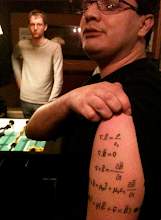Discrimination between unknown processes chosen from a finite set is experimentally shown to be possible even in the case of nonorthogonal processes. We demonstrate unambiguous deterministic quantum process discrimination of nonorthogonal processes using properties of entanglement, additional known unitaries, or classical communication. Single qubit measurement and unitary processes and multipartite unitaries (where the unitary acts nonseparably across two distant locations) acting on photons are discriminated with a confidence of >97% in all cases.
Monday, May 11, 2009
Experimental Quantum Process Discrimination
By A. Laing, T. Rudolph & J. O'Brien
Discrimination between unknown processes chosen from a finite set is experimentally shown to be possible even in the case of nonorthogonal processes. We demonstrate unambiguous deterministic quantum process discrimination of nonorthogonal processes using properties of entanglement, additional known unitaries, or classical communication. Single qubit measurement and unitary processes and multipartite unitaries (where the unitary acts nonseparably across two distant locations) acting on photons are discriminated with a confidence of >97% in all cases.
Discrimination between unknown processes chosen from a finite set is experimentally shown to be possible even in the case of nonorthogonal processes. We demonstrate unambiguous deterministic quantum process discrimination of nonorthogonal processes using properties of entanglement, additional known unitaries, or classical communication. Single qubit measurement and unitary processes and multipartite unitaries (where the unitary acts nonseparably across two distant locations) acting on photons are discriminated with a confidence of >97% in all cases.
Subscribe to:
Post Comments (Atom)

No comments:
Post a Comment